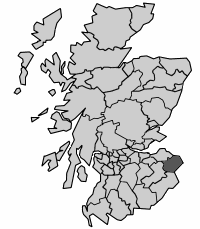http://www.gla.ac.uk/colleges/arts/graduateschool/fundingopportunities/leverhulmeenglishlanguagehough/
 The Leverhulme-funded project ‘Recovering the earliest English language in Scotland: evidence from place-names’ seeks a suitably qualified graduate to pursue doctoral research on Scottish place-names. The doctoral work will be on some aspect of the place-names of Berwickshire, and will be carried out under the supervision of Prof Carole Hough and Dr Simon Taylor. The successful candidate will have a strong background in historical linguistics, with a good first degree relevant to the history of English or Scots, and some undergraduate or postgraduate training in place-name study.
The Leverhulme-funded project ‘Recovering the earliest English language in Scotland: evidence from place-names’ seeks a suitably qualified graduate to pursue doctoral research on Scottish place-names. The doctoral work will be on some aspect of the place-names of Berwickshire, and will be carried out under the supervision of Prof Carole Hough and Dr Simon Taylor. The successful candidate will have a strong background in historical linguistics, with a good first degree relevant to the history of English or Scots, and some undergraduate or postgraduate training in place-name study.
 This 3-year project will use place-name evidence to investigate the Old Northumbrian dialect of Old English and its development into Scots. It focuses on the historical county of Berwickshire, the heartland of Anglo-Saxon settlement in Scotland, and aims to collect and analyse all place-names in six parishes along the Anglo-Scottish border, and all major settlement names throughout the historical county of Berwickshire.
This 3-year project will use place-name evidence to investigate the Old Northumbrian dialect of Old English and its development into Scots. It focuses on the historical county of Berwickshire, the heartland of Anglo-Saxon settlement in Scotland, and aims to collect and analyse all place-names in six parishes along the Anglo-Scottish border, and all major settlement names throughout the historical county of Berwickshire.


 Leverhulme Doctoral Studentship commencing April 2016
Leverhulme Doctoral Studentship commencing April 2016
‘Recovering the earliest English language in Scotland: evidence from place-names’
 The Leverhulme-funded project ‘Recovering the earliest English language in Scotland: evidence from place-names’ seeks a suitably qualified graduate to pursue doctoral research on Scottish place-names. The doctoral work will be on some aspect of the place-names of Berwickshire, and will be carried out under the supervision of Prof Carole Hough and Dr Simon Taylor. The successful candidate will have a strong background in historical linguistics, with a good first degree relevant to the history of English or Scots, and some undergraduate or postgraduate training in place-name study.
The Leverhulme-funded project ‘Recovering the earliest English language in Scotland: evidence from place-names’ seeks a suitably qualified graduate to pursue doctoral research on Scottish place-names. The doctoral work will be on some aspect of the place-names of Berwickshire, and will be carried out under the supervision of Prof Carole Hough and Dr Simon Taylor. The successful candidate will have a strong background in historical linguistics, with a good first degree relevant to the history of English or Scots, and some undergraduate or postgraduate training in place-name study. This 3-year project will use place-name evidence to investigate the Old Northumbrian dialect of Old English and its development into Scots. It focuses on the historical county of Berwickshire, the heartland of Anglo-Saxon settlement in Scotland, and aims to collect and analyse all place-names in six parishes along the Anglo-Scottish border, and all major settlement names throughout the historical county of Berwickshire.
This 3-year project will use place-name evidence to investigate the Old Northumbrian dialect of Old English and its development into Scots. It focuses on the historical county of Berwickshire, the heartland of Anglo-Saxon settlement in Scotland, and aims to collect and analyse all place-names in six parishes along the Anglo-Scottish border, and all major settlement names throughout the historical county of Berwickshire.
The project is headed by Professor Carole Hough and Dr Simon Taylor, and draws on the University of Glasgow’s considerable and growing strengths in research within Name Studies and on Scotland’s history and languages. The objectives of the research are:
- to investigate the Old Northumbrian dialect of Old English. As most Old English texts are preserved through the medium of the West Saxon literary dialect, place-names comprise key data for other varieties. The project will use place-name evidence to produce a ground-breaking study of Old Northumbrian, including its lexis, morphology and phonology.
- to investigate the development of Older Scots in the Scottish borders. Like Middle English, Older Scots is a descendant of Old English, but it is uncertain how far the differences reflect the respective varieties of Old English from which they derive, and how far they result from interaction with other languages, particularly Norse. With no evidence of major Norse settlement in the borders, there is greater continuity of language from Old English to Scots here than elsewhere, so this is the best opportunity to establish which features of Scots derive from Old Northumbrian rather than from Old Norse.
- to advance understanding of the relationship between place-names on either side of the present Scottish/English border. Cross-border comparison will both assist analysis of the project data, and lead to significant re-interpretations of place-names related to those in the study area.
- to advance the recently-inaugurated Survey of Scottish Place-Names, making available data for the study of the history of language, settlement, environment, social organisation, and the use and perception of landscape.

Candidates interested in applying for funded PhD study on this project are encouraged to make informal contact with Professor Hough (Carole.Hough@glasgow.ac.uk) in the first instance.
Candidates wishing to submit an application should prepare and submit the following documentation:
- A research proposal of no more than 1,000 words
- A current CV
- A transcript of qualifications to date (and anticipated results if you are still studying for your Masters)
- An example of scholarly work up to 5000 words in length (e.g. a full essay or dissertation chapter)
- 2 academic references

The closing date for receipt of complete applications is 12 noon on Monday, 1 February 2016. Applications should be emailed to critstudies-pgscholarships@glasgow.ac.uk.


No comments:
Post a Comment